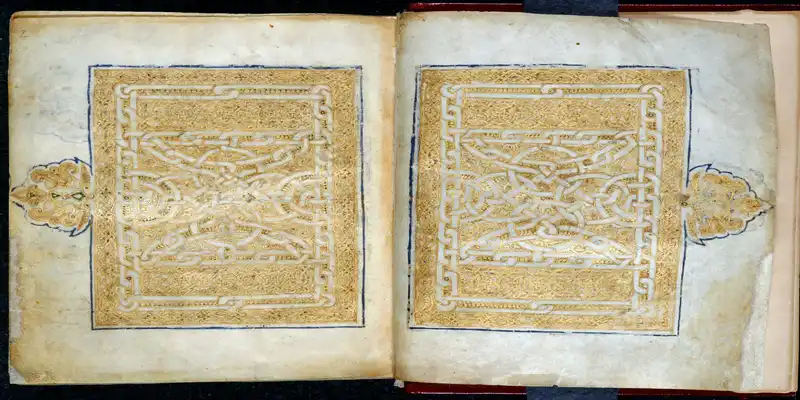Summary
Inspired by his teachers, Sheikh Sajid Umar attempts in this article to restore the balance between al-Furqān and Ummah Jāmiʿah, what he calls: the twins of principled unity. It calls the Ummah to uphold truth with clarity and compassion, preserving truth without cruelty, and brotherhood without compromise.
Between Furqān and Ummah Jāmiʿah: A Call to Principled Unity for a Wounded Ummah
When the world is in turmoil and the Ummah is severely tested, maybe with poverty, death, war, and sadly even a genocide, it becomes more vital, not less, to return to the light of revelation. Times of hardship are not pauses in our faith; they are the very moments that reveal its strength.
The reality of the matter is that the Qur’an was not revealed in comfort. It came in the midst of persecution, famine, and fear. Despite this, the Prophet ﷺ continued to teach the meaning of worship, the reality of tawḥīd, and the truth of who Allāh is. He nurtured clarity in hearts surrounded by chaos, because it is clarity that anchors believers when everything else is shaking.
History shows us that Islam does not postpone truth until times are easy. It calls to it through every storm. Our unity is not found in silence, but in shared understanding, in worship directed purely to Allāh, and in steadfastness upon what He revealed.
So rather than asking, “Is this the time for matters of creed?”, for example, perhaps we should ask, “When has it ever not been?”
And when someone says, “Do not discuss tawḥīd, or teach the methodology of the companions of the Messenger (saw) regarding the attributes of Allāh in your classrooms, or do not highlight practiced innovations in worship, because people are dying and we must not divide,” we must ask, sincerely and with balance:
Is there real unity without truth? Does true brotherhood demand silence over revelation?
A Lesson from Baghdad, 464 AH
Let us return to a moment in our history.
In fifth-century Baghdad, tension ran high between two theological trends: the Ashʿarīs and the Ḥanbalīs. At times, those tensions spilled into the streets. Reports mention brawls and even stabbings, an image that brings us sorrow.
Yet two things stand clear.
First, the true scholars of both sides condemned that behaviour. They did not celebrate it as a defence of the truth. They called it excess, a stain upon the Ummah.
Second, despite their disagreements, the senior scholars did not abandon one another. They still stood together for the moral well-being of the community.
Ibn al-Jawzī records in Al-Muntaẓam fī Tārīkh al-Mulūk wal-Umam an event from 464 AH that should humble us today.
A Ḥanbalī muftī, Abū Saʿd b. Abī ʿImāmah, once seized a female singer’s lute and cut its strings after seeing her leave the house of an amīr. The amīr sent men after him, but he escaped and sought the counsel of the senior Ḥanbalī, Abū Jaʿfar al-Hāshimī.
The next day, groups of Ḥanbalīs gathered in the palace mosque. Then, crucially, they brought in the Ashʿarī scholar Abū Isḥāq al-Shīrāzī and his students to join them.
Together, side by side, they demanded that the ruler close brothels, end public indecency, and ban the sale of alcohol. They stood as one in protecting the moral health of Baghdad. And they succeeded.cite{1}
That incident teaches us much. They did not pretend they had no differences. They continued to discuss creed. But they refused to let their differences blind them to their shared duties. They understood something we are losing; that disagreement is not meant to destroy brotherhood, rather it is meant to measure it!
Disagreement as a Test, Not a Licence
Differences of opinion concerning creed, jurisprudence, strategy, and method have long been present within this Ummah. Some fall within acceptable bounds, while others do not. Nevertheless, such differences serve as a measure of our sincerity, revealing whether we offer correction with humility or respond with pride and hostility.
But disagreement is not a licence to claim, “Your truth, my truth, many truths,” because Islam rejects such relativism.
The vast majority of scholars, including the founding Imāms of major schools of Islamic jurisprudence, were clear that the truth in any given issue rests with one of the differing opinions, even if it is not immediately clear to us which one. They agreed that with Allāh, the truth is known and precise.
Their reasoning for this conclusion was clear and grounded. It is impossible, they said, for one matter to be both lawful and unlawful, correct and incorrect, for the same person at the same time.
Also, in reality, the Companions (may Allāh be pleased with them) would correct one another and raise respectful objections when they believed a mistake had been made.
If every mujtahid’s conclusion were equally correct, such a correction would have served no purpose. Thus, whilst scholars may differ in their effort to reach the truth, the truth itself remains one.
So when we say, “We are brothers despite our differences,” we are not saying all beliefs are sound. We are saying:
"I may believe you are mistaken. You may believe I am mistaken. Yet neither of us stops being Muslim on that basis. I still owe you advice. You still deserve my respect."
That balance is the Sunnah.
Brotherhood as Duty, Not Sentiment
The Prophet ﷺ said,
المُسْلِمُ أَخُو المُسْلِمِ لا يَظْلِمُهُ ولا يَخْذُلُهُ ولا يَكْذِبُهُ ولا يَحْقِرُهُ
“The Muslim is the brother of the Muslim: he does not wrong him, abandon him, lie to him, or look down on him.”cite{2}
Brotherhood here is not mere emotion. It is a duty of care. It means:
- I cannot abandon you when I believe you are slipping.
- Even if you may enter Paradise before me, I must still advise you.
- I must advise with respect, not insult.
- I cannot use you as a public trophy. My aim must be your safety in the Hereafter, not applause in this world.
Our scholars, at their best, lived by this. They did not pretend that creed did not matter, for example, nor did they act as rivals. They recognised two obligations running side by side:
- Furqān: drawing the line where Allāh drew it, preserving the Islam of the Ṣaḥābah in belief and worship.
- Ummah Jāmiʿah: safeguarding the dignity, safety, and honour of Muslims as one body, even in disagreement.
This balance shone brightly in the lives of the great scholars of our tradition, from the earliest generations to those who came after, and among them it was exemplified with remarkable clarity in the life of Ibn Taymiyyah.
Ibn Taymiyyah: Firm in Creed, Gentle with the Ummah
Shaykh al-Islām Ibn Taymiyyah is known to have devoted his life to preserving the religion upon the understanding of the earliest generations. He authored al-ʿAqīdah al-Wāsiṭiyyah, al-Ḥamawiyyah, at-Tadmuriyyah, and others, responding point by point to what he believed strayed from the creed of the Ṣaḥābah.
He argued that Allāh must be described only as He described Himself and as His Messenger ﷺ described Him, without shifting meanings or comparing Allāh to His creation. That was his Furqān; clarity creed.
But he also embodied Ummah jāmiʿah. Meaning, He refused to rush to takfīr and said of misguided Muslims that if their error came from misinterpretation, it did not remove them from Islam.
And this balance was not confined to books. It was lived. Despite his theological disagreements with the Mamluk leadership, disagreements so serious that he refuted many of their positions in writing, he nonetheless rode out with the Mamluk army to defend the Muslim lands against the Tatars.
When the Sultan reached Shaqhab, Ibn Taymiyyah met him at Qarn al-Ḥurra, urging him to remain steadfast.
Upon seeing the overwhelming numbers of the enemy, the Sultan exclaimed, “O Khālid bin Walīd!”
Ibn Taymiyyah immediately corrected him, saying, “Do not say that. Rather, say ‘O Allāh!’ Seek help from your Lord alone, for He alone grants victory. Say: ‘Master of the Day of Judgement, You alone we worship and You alone we ask for help.’”cite{3}
Even in that tense and charged moment, Ibn Taymiyyah corrected him and upheld pure tawḥīd while standing beside those he differed with.
Here, the two elements of the thesis: Furqān and Ummah Jāmiʿah, meet in perfect harmony. Despite their errors, he was with them; despite being with them, he corrected them. He neither withdrew from the community nor diluted the truth.
His conduct in the field of battle proved that principled unity is not merely an idea to be written about but a principle to be lived.
Also, when he was later imprisoned and slandered by judges who accused him of anthropomorphism, he did not seek revenge once Allāh granted him the moral upper hand...
One of his fiercest opponents, the Mālikī Chief Judge Ibn Makhlūf, had tried to have him condemned. Yet Ibn Taymiyyah interceded for him, pardoned him, and ensured he remained in his post for the benefit of the people.
Ibn Makhlūf himself admitted: “We tried to overpower Ibn Taymiyyah and could not. When he could have overpowered us, he pardoned us and pleaded for us.”cite{4}
That is the Sunnah lived.
Ibn Taymiyyah could write multi-volume refutations against a group's theology, yet still defend an adherent's dignity when wronged. He taught his students not to insult the Imāms of other schools and said that those who curse recognised scholars deserve punishment.cite{5}
In other words, one may say, “This view is wrong,” without saying, “This person is worthless.” That is maturity; the opposite of the petty hostility that dominates Muslim discourse today.
When Silence Protects, and When It Poisons
Some say, “We are not mature enough. We cannot handle theological debate without it turning ugly, so we should all stay silent.”
There is some wisdom in that, but only partially...
If we cannot control our manners, we should indeed remain quiet until we learn restraint. But if silence is truly for the sake of peace, then it must be shared silence by all sides, all movements, all platforms.
If one group falls silent “for unity” while another continues to teach, recruit, and spread its ideology unchecked, that is not peace. It is surrender! Silence, in that case, poisons truth, and it leads to the next generation growing up thinking that what is unchallenged is unquestionable.
Accordingly, the paradigm should not be permanent silence, but responsible speech; speech guided by adab and purpose. That we:
Teach with evidence, not rage. Teach with mercy, not mockery. Teach with the intention to protect a Muslim in the Hereafter, not to ruin him in the world.
That is what the scholars of Baghdad did in 464 AH, and what Ibn Taymiyyah did in the 700s AH. They exhibited firmness with grace, and clarity with compassion.
The Ummah of Daʿwah Cannot Abandon Daʿwah
We are described in the Qur’an as khayra ummah, the best nation raised for mankind. That means we call to what is right, forbid what is wrong, and believe in Allāh. That is daʿwah, and it should not pause in hardship. If anything... hardship should sharpen it.
On the topic of creed, for example, it should not be treated now as an academic pastime. It should be given its right and treated as worship. It shapes duʿā’, ṣalāh, and tawakkul. To silence its teaching at a time when misconceptions are spreading, and when Muslims are crying out to their Lord, is to sever them from the very One they are calling upon. That is not mercy, it is harm.
What Principled Unity Looks Like
Principled unity is not about abandoning correction, nor is it the claim that all opinions carry equal weight. It can never be confused with pluralism, nor reduced to the notion of “your truth, my truth is all the same.”
True unity is this:
- I stand with you as my Muslim brother or sister because Allāh said: “The believers are nothing but brothers, so reconcile between your brothers, and fear Allāh that you may receive mercy.”cite{6} This verse affirms the bond and commands us to mend it. It does not ask us to deny tension, but to manage it with taqwā.
- I refuse to wrong you, betray you, or abandon you, even in disagreement. The Prophet ﷺ forbade wronging or forsaking a brother. That includes theological opponents.
- I will still call you to what I believe is right. That is Furqān. I must preserve the Islam of the Ṣaḥābah without watering it down for comfort.
- I will still protect your safety and honour. That is Ummah jāmiʿah. I will not hand you to tyrants or cheer for your humiliation. I will use whatever influence I have to prevent injustice against you, just as Ibn Taymiyyah interceded for his own accusers.
This is the prophetic balance: preserving the Ummah without sacrificing truth, and preserving truth without sacrificing the Ummah.
Our Task Now
We are the Ummah of daʿwah. If we truly believe that, then:
- Emotion alone towards each other is not enough.
- We must not belittle teaching correct what we believe is Islam upon the understanding of the companions of the Messenger (saw), especially when it nourishes duʿā’, patience, trust, and hope.
- We must stand together for the oppressed and all just causes, as the scholars of Baghdad did when they cooperated to end public corruption during a time of tension.
- We must insist on maturity in discourse and ādāb. Firmness is not foulness, and passion is not permission to humiliate.
Let us be clear: The Qur’an described disputing Muslims as believers. This means that you are my brother, even if I believe you are wrong. You may enter Paradise before me, but that does not cancel my duty to advise you. That said, my duty to advise you does not cancel your right to be honoured. This is not weakness, but strength, and this is how a mature Ummah behaves.
We have to live upon the mandate of the verse:
إِنَّمَا الْمُؤْمِنُونَ إِخْوَةٌ فَأَصْلِحُوا بَيْنَ أَخَوَيْكُمْ وَاتَّقُوا اللَّهَ لَعَلَّكُمْ تُرْحَمُونَ
“The believers are nothing but brothers, so reconcile between your brothers, and fear Allāh that you may receive mercy.”
If we live by this āyah with Furqān and Ummah jāmiʿah, our disagreements will become a means of purification, not destruction.
May Allāh grant us clarity without cruelty, firmness without arrogance, and unity without surrender. May He make us instruments of reconciliation and carriers of the truth of His dīn. Āmīn.
begin{footnote}
- Ibn al-Jawzī, Jamāl al-Dīn Abū al-Faraj ʿAbd al-Raḥmān ibn ʿAlī.Al-Muntaẓam fī Tārīkh al-Umam wal-Mulūk. Ed. Muḥammad ʿAbd al-Qādir ʿAṭā and Muṣṭafā ʿAbd al-Qādir ʿAṭā. Beirut: Dār al-Kutub al-ʿIlmiyyah, 1st ed., 1412 AH / 1992 CE.
- Ṣaḥīḥ al-Bukhārī 2442; Ṣaḥīḥ Muslim 2580.
- See: Ibn Faḍl Allāh al-ʿUmarī. Masālik al-Abṣār fī Mamālik al-Amṣār. (Abu Dhabi: al-Majmaʿ al-Thaqāfī), vol. 5, 701.
- Ibn Kathīr, Ismāʿīl ibn ʿUmar.Al-Bidāyah wa’n-Nihāyah, vol. 14, p. 54.
- See: Ibn Taymiyyah, Taqī al-Dīn Aḥmad ibn ʿAbd al-Ḥalīm. Rafʿ al-Malām ʿan al-Aʾimmah al-Aʿlām (The Removal of Blame from the Great Imāms
- Qur’an, Sūrat al-Ḥujurāt 49:10
end{footnote}




Comments
JazakAllah khayr sh. Sajid Allah bless you for this balanced article. I think you struck a fair balance for making the case of being firm in principles and fostering unity even in the face of disagreements. I believe there is room in our community and mashayikh to both strive for clarity in our aqeedah/fiqhi positions and maintaining respectful unity amid our differences.